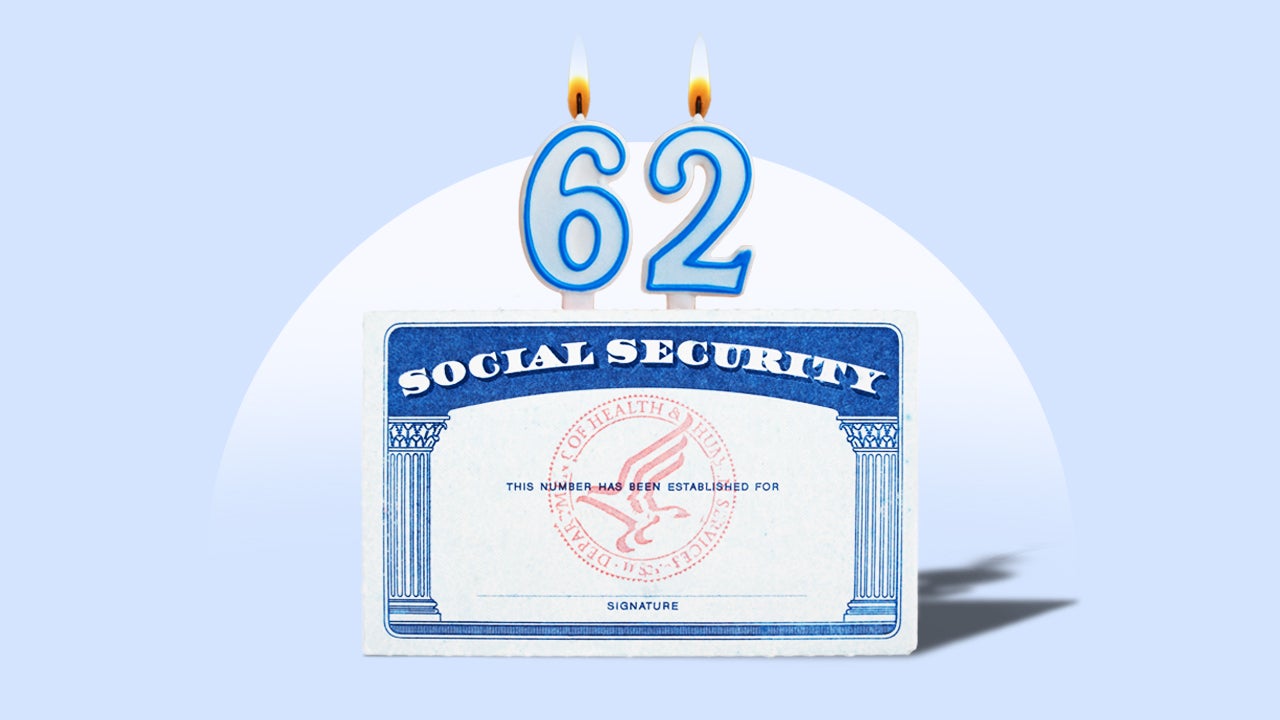Image by GettyImages; Illustration by Bankrate
The resounding advice about filing early for Social Security retirement benefits is pretty unambiguous: Don’t do it.
However, if you can’t delay — due to immediate cash flow needs — or don’t want to because you’re worried about the Social Security program’s solvency, the earliest you can start receiving benefits is age 62.
Not everyone can afford to wait until their full retirement age (66 or 67, depending on the year you were born) to start claiming benefits, let alone postpone filing until age 70 to lock in an even higher payment. Just know that filing early comes with a significant pay cut that will significantly lower your retirement payment each month for the rest of your life.
Before we tally the cost of filing for benefits at age 62, let’s calculate the size of your Social Security check based on how much you currently earn.
Your Social Security benefits check at age 62
Social Security benefits are calculated using a not-so-secret formula based on the number of retirement credits you’ve earned during your lifetime and how much you’ve paid into the system over your 35 highest-earning years.
If you’re a bit rusty on actuarial reduction math, bend points and current tax law, don’t worry: There are calculators for all of that!
Based on Bankrate’s Social Security calculator, here’s how much five hypothetical 62-year-old retirees would receive in benefits based on their pre-retirement incomes:
| Annual pre-retirement salary | $30,000 | $50,000 | $75,000 | $100,000 | $150,000 |
| Monthly | $787 | $1,051 | $1,387 | $1,673 | $2,196 |
| Yearly | $9,444 | $12,616 | $16,639 | $20,077 | $26,349 |
What you don’t see in the table above is how much money beneficiaries lose out on by choosing to file as early as they possibly can.
The Social Security Administration (SSA) reduces what it pays beneficiaries by 5/9ths to 5/12ths of one percent for each month you file for benefits before reaching full retirement age. Those fractions-of-a-percentage reductions may look like rounding errors — a mere paper cut to your earned benefits. But over time, they inflict some serious damage.
By opting to draw payments at age 62, early retirees sacrifice 30 percent of the Social Security retirement benefits they would get if they waited another five years to file at age 67. In practical terms, that means $346 to $966 less to spend per month for the five salary scenarios we calculated.
You can find out exactly how much it will cost you to claim at 62 by setting up a “my Social Security account” and using the Social Security Administration’s (SSA) benefit calculator.
Here’s how much it’s worth to wait a few more years to file
If you’re set on retiring before your full retirement age, holding out just a few additional years beyond age 62 can really pay off.
Wait until age 64 to start collecting, and you’ll receive 80 percent of the retirement benefits you’ve accrued. Push through to 65 or 66, and you qualify for 86 and 93 percent of your full benefits, respectively.
After 67 (the age you qualify to claim 100 percent of the benefits you’ve earned) you move into bonus territory and start earning delayed retirement credits. The credits get you an 8 percent annual benefit bump each year up to age 70.
Here’s how those percentages play out in concrete dollar amounts:
| Claiming age | Initial monthly benefit based on annual pre-retirement salary | ||||
| $30,000 | $50,000 | $75,000 | $100,000 | $150,000 | |
| 62 | $787 | $1,051 | $1,387 | $1,673 | $2,196 |
| 63 | $839 | $1,121 | $1,479 | $1,785 | $2,342 |
| 64 | $909 | $1,215 | $1,602 | $1,933 | $2,537 |
| 65 | $979 | $1,308 | $1,726 | $2,082 | $2,732 |
| 66 | $1,049 | $1,402 | $1,849 | $2,231 | $2,928 |
| 67 | $1,133 | $1,514 | $1,997 | $2,409 | $3,162 |
| 68 | $1,217 | $1,626 | $2,145 | $2,588 | $3,396 |
| 69 | $1,301 | $1,738 | $2,292 | $2,766 | $3,630 |
| 70 | $1,385 | $1,850 | $2,440 | $2,945 | $3,864 |
Here’s the “wow” breakdown of how much it pays to wait: A $75,000 earner who claims at age 70 instead of 62 locks in $1,053 extra in retirement benefits per month. If the prospect of waiting eight years is just too much, could you hold out for four and file at 66 instead of 62? That move will get you an additional $462 each month in income.
Need a filing do-over?
In certain situations, the SSA allows recipients to reverse their filing decision by either suspending or withdrawing (and repaying) benefits. Here’s more on how to change your Social Security benefits.
Delaying benefits: Estimate your life expectancy to determine the best age to start claiming
The lure of a larger monthly paycheck is a strong argument to wait as long as you can to file for benefits. That said, there’s a risk that you may not live long enough to max out your lifetime Social Security earnings. (Dark, we know. But life expectancy is a key consideration in determining the best age to claim Social Security.)
Running a break-even analysis allows you to compare your cumulative benefits based on different claiming ages and your expected lifetime. (Financial planning software can help you crunch the numbers.)
Settling for reduced benefits for a longer period of time can also make sense for those who can draw from personal retirement investments to supplement their income. For couples, it can be beneficial for the lower-earning spouse to file early to enable the higher earner to delay, maximizing future spousal benefits.
Bottom line
We know you came here for the simple answer to how much Social Security you can get if you start collecting at age 62. (Scroll up to that first table for the very rough back-of-the-envelope estimate.) Hopefully you leave knowing that there’s more to figuring out the best age to file than just the size of your eventual retirement paycheck.
There’s a reason so many pre-retirees seek professional guidance before filing for Social Security: It’s a decision that impacts the amount of money you’ll receive for the rest of your life, and you could quickly earn back the advisor’s fee with the right decision.
Why we ask for feedback
Your feedback helps us improve our content and services. It takes less than a minute to
complete.
Your responses are anonymous and will only be used for improving our website.
Help us improve our content
Read the full article here
















